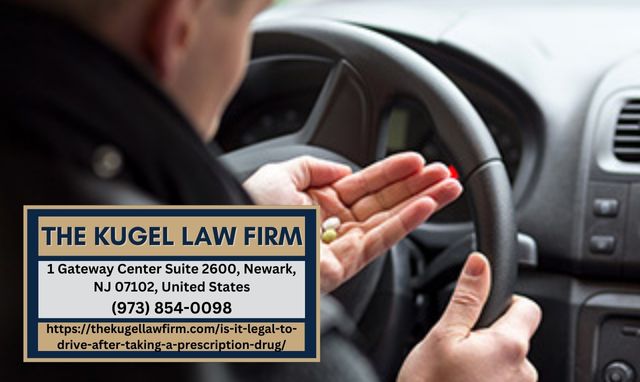Driving under the influence (DUI) is considered a serious offense throughout the United States, including New Jersey. The state of New Jersey has adopted a strict stance against DUI offenses and imposes significant penalties on convicted individuals. As such, a common concern is the likelihood of facing jail time for a first DUI in New Jersey. However, while there is the notion that prosecutors are more lenient to first-time offenders, it is important to note that each case is unique, and various factors, such as blood alcohol content (BAC), presence of minors in the vehicle, and whether the driver caused property damage or injury, can greatly influence the outcome.
Employing the help of a skilled New Jersey DUI attorney can help in navigating the legal complexities involved in your case. An attorney can carefully assess the case’s details, and develop a strong defense strategy. They can also provide clarity on potential penalties and work tirelessly to minimize the severity of the consequences. At The Kugel Law Firm, our team of experienced New Jersey DUI lawyers may be able to scrutinize the legality of the DUI stop and the accuracy of the sobriety tests conducted, potentially leading to reduced charges or case dismissal. Contact us today at (973) 854-0098 to schedule a consultation.
Understanding DUI Laws in New Jersey
Driving under the influence (DUI) in New Jersey refers to operating a motor vehicle while impaired by alcohol or drugs. This impairment signifies that a driver’s blood alcohol concentration (BAC) is above the legal limit, or their ability to safely operate a vehicle has been compromised by alcohol or drugs. For adult drivers (aged 21 years and older) and commercial drivers, the BAC limit is at 0.08% and 0.04% respectively. However, drivers under 21 years of age or commercial drivers are subject to lower limits: 0.01% BAC for underage drivers.
Furthermore, New Jersey DUI laws also make it illegal to drive under the influence of any amount of a controlled substance, such as marijuana or prescription drugs, if it impairs your driving ability. The DUI laws apply to private and commercial drivers and boaters alike.
Possible Charges and Penalties
New Jersey has strict penalties for DUI offenses, which increase based on the driver’s BAC level, the number of prior offenses, and other aggravating factors. Potential penalties might include fines, jail time, driver’s license suspension, and installation of an ignition interlock device.
First Offense
In New Jersey, the penalties for a first-time DWI offense vary depending on your blood alcohol concentration (BAC). However, for subsequent offenses, the penalties remain the same regardless of your BAC.
If your BAC is between 0.08% and 0.10%, the initial punishment for a DWI offense includes:
- Fines ranging from $250 to $400
- Maximum jail sentence of 30 days
- Suspension of driver’s license until an ignition interlock device is installed
- Attendance at an Intoxicated Driver Resource Center for 12 to 48 hours
- Mandatory use of an ignition interlock device for three months
For a first offense with a BAC level above 0.10% but under 0.15%, the subsequent penalties apply:
- Fines ranging from $300 to $500
- Maximum jail sentence of 30 days
- Suspension of driver’s license until an ignition interlock device is installed
- Attendance at an Intoxicated Driver Resource Center for 12 to 48 hours
- Mandatory use of an ignition interlock device for seven months to one year
In the case of a first offense with a BAC level above 0.15%, the following penalties apply:
- Fines ranging from $300 to $500
- Maximum jail sentence of 30 days
- Driver’s license suspension for four to six months
- Attendance at an Intoxicated Driver Resource Center for 12 to 48 hours
- Mandatory use of an ignition interlock device during suspension and for nine to 15 months thereafter
The penalties listed above are not exhaustive. For example, MVC will also issue a surcharge of $1,000 per year for three years, insurance rates may increase, or you can even be dropped from your insurance policy as a result of a DUI conviction.
Refusal to submit to a breathalyzer test may also lead to additional penalties, such as license suspension, fines, and installation of an ignition interlock device for longer periods of time than described above.
| DUI Offense Level | Fines | Legal Consequences |
|---|---|---|
| First Offense (BAC 0.08% – 0.10%) | Fines: $250 – $400 | Maximum 30-day jail sentence, License suspension until ignition interlock device is installed, Attendance at an Intoxicated Driver Resource Center (IDRC) for 12-48 hours, Mandatory ignition interlock device for three months |
| First Offense (BAC > 0.10% but < 0.15%) | Fines: $300 – $500 | Maximum 30-day jail sentence, License suspension until ignition interlock device is installed, Attendance at an IDRC for 12-48 hours, Mandatory ignition interlock device for seven months to one year |
| First Offense (BAC > 0.15%) | Fines: $300 – $500 | Maximum 30-day jail sentence, License suspension for four to six months, Attendance at an IDRC for 12-48 hours, Mandatory ignition interlock device for nine to 15 months |
| Second Offense | Fines: $500 – $1,000 | Maximum 90-day jail sentence, License suspension for one to two years, Mandatory attendance at an IDRC for 48 hours, Mandatory 30-day community service, Mandatory ignition interlock device for two to four years (in addition to suspension) |
| Third Offense and subsequent offenses (BAC > 0.08%) | Fines: $1,000 | 180-day imprisonment, Eight-year driver’s license revocation, Decision regarding IDRC made individually, Mandatory ignition interlock device for 2 to 4 years (in addition to suspension) |
New Jersey’s Implied Consent Law
New Jersey has an “implied consent” law, which means that drivers are deemed to have consented to a breath test when they obtain a driver’s license. Refusal to take a breath test is a traffic offense in New Jersey, and it may lead to penalties similar to those for a DUI conviction.
According to the Implied Consent Law (N.J.S.A. 39:4-50.2(a)), if you operate a motor vehicle on any public road, street, highway, or quasi-public area in this State, it is understood that you have given your consent for the authorities to take samples of your breath. These samples will be used to conduct chemical tests and determine the alcohol content in your blood. However, this consent is valid only if the sampling is carried out following the provisions of this law and upon the request of a police officer who has reasonable grounds to believe that you have been driving a motor vehicle in violation of the law.
Factors Affecting Jail Time for First DUI
When an individual is arrested for driving under the influence (DUI), they face a range of potential consequences. For a first-time offender, the most significant concern is typically the amount of jail time they may serve. Several factors can influence a judge’s sentencing decision, including the specifics of the case and the degree of intoxication. This article will discuss the factors that may affect the amount of jail time for a first-time DUI offender.
Level of Intoxication (BAC) and Impairment
The blood alcohol concentration (BAC) of an individual at the time of arrest plays a significant role in determining the penalties for a DUI conviction. In most cases, a BAC of 0.08% or higher is considered legally intoxicated. However, the severity of the charges and potential jail time can increase based on the level of intoxication.
For those stopped for driving while impaired with drugs, the presence of prohibited drugs in the vehicle can also impact the sentencing given by the judge.
Presence of Minors in the Vehicle
Having children or minors present in the vehicle during a DUI arrest can significantly impact the penalties faced by a first-time offender. In New Jersey, committing a DWI offense with a minor passenger is considered a disorderly persons offense, similar to a misdemeanor.
The potential consequences upon conviction include up to six (6) months in county jail, a $1,000 fine, a six (6) month suspension of the driver’s license, and five (5) days of community service. Judges often adopt a tough stance when dealing with DUI cases, and the presence of a child in the car only worsens the defendant’s situation.
Long-Term Consequences of DUI Convictions
A DUI conviction can significantly impact a person’s life beyond the immediate legal penalties. It’s important to remember that even if the possibility of incarceration is minimal for a first-time DUI conviction, the long-term consequences can still include penalties that can impact the following:
- Employment: DUI convictions can make it difficult to find or maintain employment. Employers might hesitate to hire an individual with a DUI record due to liability concerns or negative implications for the company’s image. In addition, some employers may require a clean driving record as a condition of employment and terminate an employee with a DUI conviction.
- Education: Colleges and universities might deny admission or revoke financial aid to students with DUI records. Their chances of enrolling in certain programs, such as law or medicine, may also be slim due to their criminal history.
- Insurance premiums: A DUI conviction often results in a marked increase in auto insurance premiums. Some insurance companies might even cancel policies or deny coverage to individuals with DUI records.
- Professional licenses: For those who possess professional licenses, a DUI conviction can lead to suspension or revocation, as well as additional disciplinary actions from governing bodies.
- Future legal consequences: Having a DUI conviction on record may lead to harsher penalties if the individual is arrested for a subsequent DUI or for committing other crimes.
- Impact on relationships: A DUI conviction can strain personal relationships and contribute to feelings of shame, guilt, and isolation.
Getting the Legal Help of a Skilled New Jersey DUI Lawyer
The possibility of facing jail time for a first DUI offense in New Jersey, although not guaranteed, is certainly a realistic outcome due to the state’s strict laws. Various factors, such as the degree of impairment, presence of minors in the vehicle, and any resulting harm or property damage, can significantly impact the final verdict. This emphasizes the gravity of a DUI charge, even for individuals with no prior convictions, and highlights the potentially life-altering consequences it may entail.
For first-time offenders who are unfamiliar with the intricacies of DUI laws and court proceedings in New Jersey, navigating the system can be overwhelming. At The Kugel Law Firm, our team of New Jersey DUI attorneys may be able to negotiate plea deals or dismissals on your behalf, present arguments for reduced charges or penalties, and guide you through the entire legal process. Contact us today at (973) 854-0098 to learn more about how we can help.
from Kugel Law Firm – DWI/DUI Defense in New York & New Jersey https://thekugellawfirm.com/how-likely-is-jail-time-for-first-dui-in-new-jersey/


